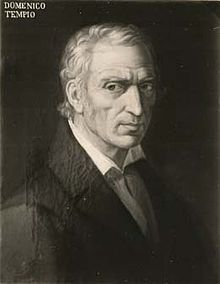
dal 1996 in continua innovazione tecnologica!
Sfrutta tecnologie avanzate per avere un sito web ottimizzato al 100%

Domenico Tempio is considered the greatest Sicilian reformer poet, whose
voice is at the same time as that of Parini in Lombardy. He was admired
and praised by his contemporaries, but after his death his work was
almost forgotten, except for some compositions of a licentious character
which, published in the stain, gave him an unjust fame as a
pornographic poet. With the resumption of studies on the Sicilian
eighteenth century, after the Second World War, even the work of the
Temple was re-evaluated and subjected to a serious critical examination.
The
education of the Temple, as we have seen, was founded on the basis of a
pure Enlightenment with a strong classicistic component. His language
(except for some rare exceptions) is that of Sicily, and confirms a long
tradition of linguistic and literary autonomy that extends from the
vulgar Sicilian to almost our days.
Domenico Tempio (Catania 22/08/1750 - 4/02/1821)
He was born on 22nd August 1750 from Giuseppe, a wood merchant, and from Apollonia Arcidiacono.
Third of seven children, he was destined for the priesthood and then entered the archiepiscopal seminary, which was at that time the most important school in the city.
He came out at the age of 23, in 1773, and his father, having seen his son's priestly vocation failed, wanted to start it for the legal profession, but even this attempt failed, because the young Domenico preferred to continue on the path of humanistic studies.
All his life, which lasts 71 years, until February 4, 1821, is a cult of poetry that should not be confused with that of literature in the usual verses to the flowery branch of the Petrarchs and D'Annunzio, but it is the custom of life, physiology become rhythm as in Dante Alighieri or Baudelaire, hello, of course, the different, and more or less complex, cultural components.
Not many or continuous are the biographical information of the Temple; but none of these contrasts with the character and education described above, with a sensitivity that is all the more lovable, at least cloaked in magne pretese. The confessions, disseminated in the work, and particularly in the major poem, are explicit, now implicit, always sober and frank. For Caterina, the faithful and generous nurse, we find only two verses: << But you do not then expose me / of minds, or Caterina >> (Carestia, III, 521); and enough is enough to probe the modesty of the Temple. And poverty? His house is a hovel of beyond suburbs: << surgi lu miu tuguriu / between sciari and petri tunni >>. (Car., VI).
The poetry of the temples wants to be free, it denounces the vices and the wickedness of men, and points out in ignorance the first cause of every evil (Odi supra ignuranza). His satire, often harsh and pungent, aims at the moral renewal of society and the redemption of men from poverty, but poetic values often emerge above the intentions.
The major work of Domenico Tempio is the poem La Caristia (in twenty songs and in quatrains of septenaries), where the poet describes the popular riots which gave rise, in Catania, to the famine of 1797-98. The ghostly figures of the hungry are wandering in the revolting riot, finally in the function of protagonists and no longer of disinherited slaves. The Famine, above its strident cart, wanders among a crowd of desperate hungry men, who sways and breaks in with irresistible fury. The lyrical passages are inserted in the tragedy as brackets of peace and abandonment, creating a loving background that is the world cherished, but not reached, by the poet. Each of those revolutionary beggars has a sad story to tell, and it is the complex of all these human stories that determines the unity and genuineness of the poem.
If Giovanni Meli is the greatest representative of Sicilian Arcadia, Domenico Tempio is the most effective interpreter of those renewing ferments that had penetrated widely on the island during the century. XVIII.
The naturalistic impulse imprinted on Sicilian culture from the Temple between the eighteenth and nineteenth centuries will attenuate the romantic resonances in Greek Sicily and will determine, on the same moral level and in the same catanese environment, the veristic recovery at the end of the century.
He translated some Latin classics (Livio, Orazio, Tacitus, Virgil), and he read Machiavelli and Guicciardini carefully, together with the major Italian poets from Dante to his contemporaries. But the special attention given to some of the most discussed representatives of French culture, such as Carlo Rollin (1661-1741), who as a cutler son had become rector of the University of Paris, and Antonio Goguet (1716- 1758), who had attempted to affirm a state of nature on the basis of ethnography, showing that ideas always derive from facts.
Soon the Temple gained fame as a good poet and was welcomed in the Academy of the Palladii and in the literary salon of the patron Ignazio Paterṇ prince of Biscari.
